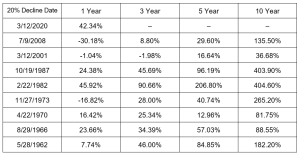What Should I Do?
Published On: June 13, 2022
Written by: Ben Atwater and Matt Malick
When financial markets become tumultuous, many investors look to take action. Some sell stocks, planning to reenter the market when things calm down. But getting out of the market and then reinvesting near the bottom is impossible. You won’t know that the bottom is in until long after stocks have recovered.
Other investors look to diversify into whatever asset class is delivering positive returns. But chasing performance only leads to poor results as you’ll consistently be late to the party.
And a few might even take a flyer on a beaten down cryptocurrency or meme stock. But these underlying assets still have little to no value, as we discussed in a recent client update.
Our advice is not exciting but, in our opinion, far more sound… do nothing. Don’t abandon your disciplined investment process. Disregard the daily financial news and market predictions. Even ignore your account statements or custodian website.
Stick with the stocks you already own and, if you have available cash flows and you are underweight equities relative to your target asset allocation, buy more.
This might be a poor one month, one year or even three year strategy. But as a long-term equity investor, you are highly likely to profit.
The S&P 500 just entered bear market territory, down over 20% from its January 3rd high, ignoring dividends. Here are the cumulative forward returns, including dividends, you would have earned following each 20% price decline since 1960. We used the Fidelity Fund (FFIDX), which is Fidelity’s oldest mutual fund and invests in common stocks, as a proxy for market returns.

As you can see, sometimes 20% drops are just the beginning, like in 2008 and 1973. But more often they are short-term opportunities like in 2020, 1987, 1982 and 1966. Regardless, the preceding decades show that 20% drops are most certainly long-term opportunities.
Our clients are familiar with our long-term, low turnover investment approach. But we are always available to discuss your portfolio during these tough market conditions. Please do not hesitate to reach out to us.
Mar 21, 2024
Feb 27, 2024